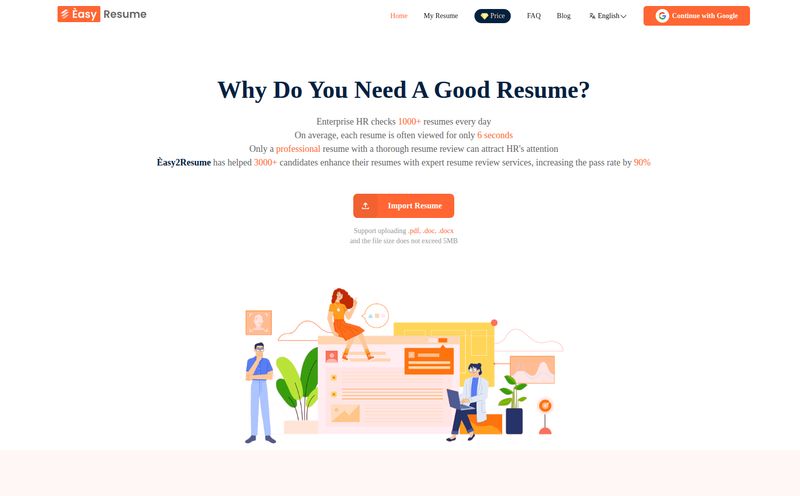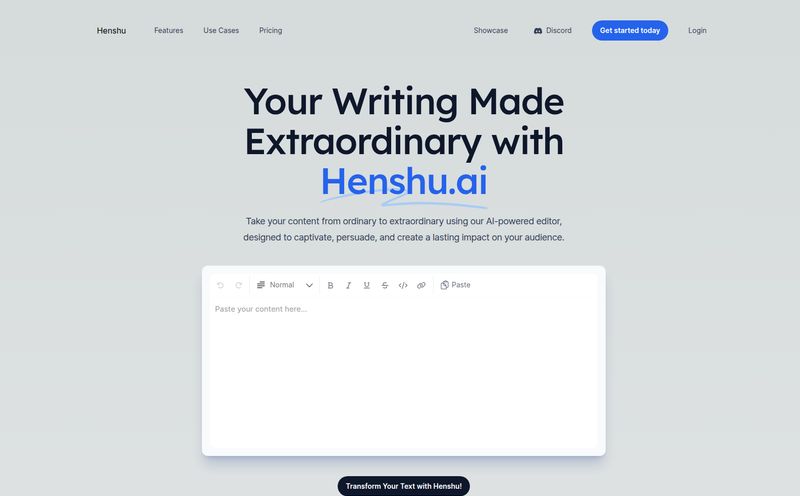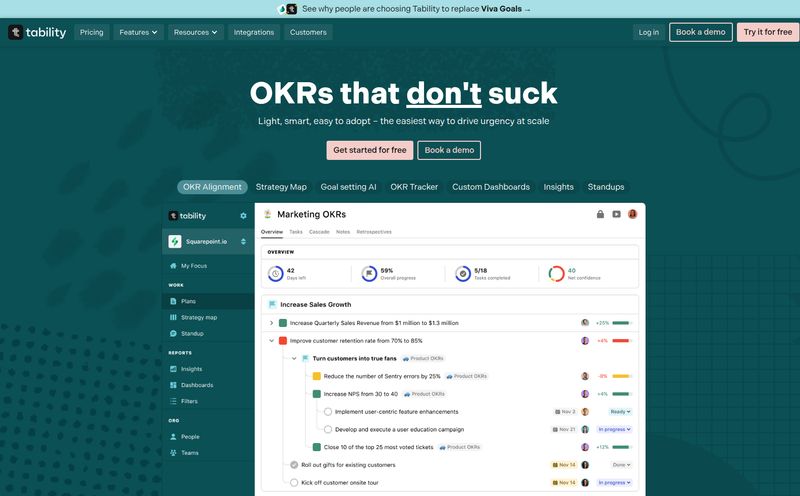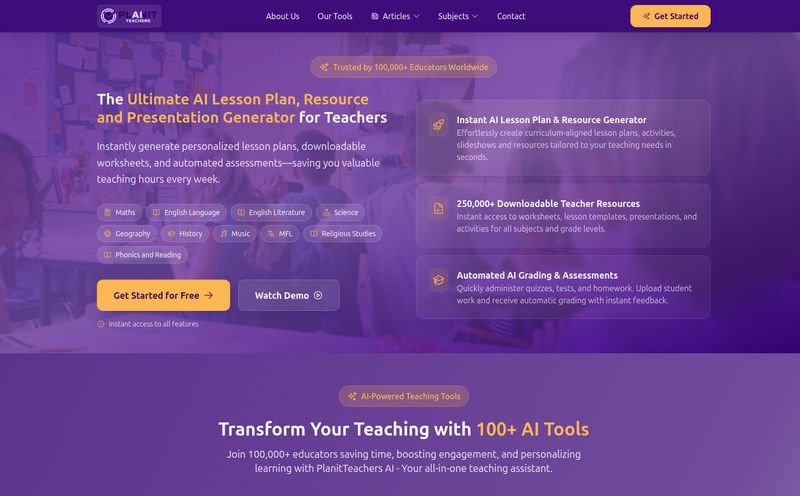If there’s a universal circle of hell reserved for job seekers, it’s the one where you’re forced to write cover letters for eternity. That blinking cursor on a blank page... it mocks you. You try to sound professional but not robotic, enthusiastic but not desperate. You use phrases like “I am writing to express my keen interest” so many times you start to question if you have any interests at all. It’s a grind.
For years, I've preached the gospel of personalization. No generic templates! Tailor every single one! And I stand by that. But man, is it exhausting. So when the wave of AI tools started cresting, promising to automate the soul-crushing parts of our lives, my inner SEO-and-traffic-nerd got curious. Could a robot really write a cover letter that doesn’t sound like… well, a robot? I decided to take one of the more focused tools, Cover Letter Companion, for a spin. I was skeptical, to say the least.
What Exactly is Cover Letter Companion?
So, what’s the big idea here? In simple terms, Cover Letter Companion is an AI tool specifically designed to do one thing: write cover letters. You don't give it a vague prompt like you would with a general-purpose AI like ChatGPT. Instead, you feed it the two most important documents in your job application: your resume and the job description.
Think of it less as a ghostwriter and more like a hyper-focused research assistant. It scans your entire career history, picks out your most relevant skills and achievements, and then cross-references them with the exact things the employer says they're looking for. The goal is to create a compelling, tailored letter that bridges the gap between what you’ve done and what they need. A pretty neat concept, right? It promises to cut through the fluff and get right to the point, which is exactly what a tired hiring manager wants to see.
Putting It to the Test - My Experience
Alright, theory is one thing, but execution is everything. I grabbed a sample resume for a 'Digital Marketing Manager' and a real job posting from LinkedIn. Time to see if this thing could walk the walk.
The process itself is surprisingly straightforward, broken down into a few simple steps. First, you give it your resume. You can upload a PDF or just paste the raw text. I opted for the PDF upload, because who has their resume in plain text anymore? Then comes the crucial part: you paste in the job description. I can't stress this enough – the quality of the job description you provide will directly impact your result. Garbage in, garbage out, as they say.
I pasted in a meaty description, full of corporate jargon and specific KPIs. I hit the button. Waited a few seconds, holding my breath. And then... it appeared.
The AI spat out a full-blown cover letter. And honestly? It wasn't bad. Not bad at all. It correctly identified that my 'experience with SEO and PPC campaigns' was a direct match for their requirement for a 'proven track record in search engine marketing.' It structured the letter logically: an intro, a few body paragraphs highlighting specific matches, and a professional closing. It was a solid B+ first draft, created in about 30 seconds.
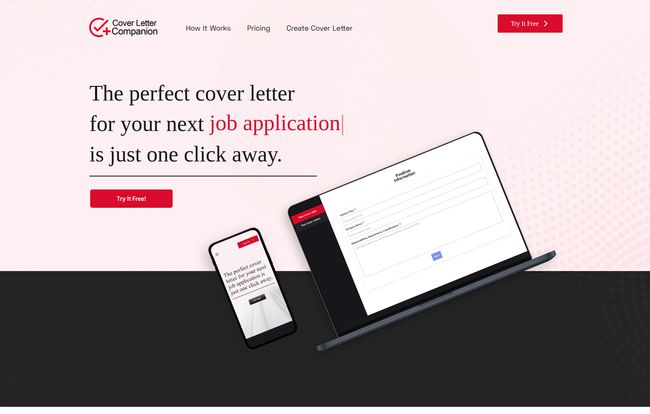
Visit Cover Letter Companion
The Good, The Bad, and The AI-Generated
No tool is perfect, and this one is no exception. It has some brilliant moments and a few things you absolutely need to be aware of before you start firing off applications.
Where It Genuinely Shines
The most obvious win is the sheer speed. It transforms the cover letter process from a 45-minute agonizing slog into a 5-minute editing job. It’s a fantastic cure for writer’s block. Instead of a terrifying blank page, you get a fully-formed structure to work with. For me, that's half the battle.
It’s also incredibly good at keyword matching for Applicant Tracking Systems (ATS). You know, the robotic gatekeepers that scan your resume before a human ever sees it? This tool speaks their language. It pulls the exact phrasing from the job description and mirrors it with your experience, which can seriously increase your chances of getting past that initial filter. It found connections I might have glossed over myself after reading the 15th job description of the day.
A Few Caveats and Reality Checks
Now for the other side of the coin. This AI can't capture your voice. The output is professional, competent, and a little… generic. It lacks true personality, the little spark that makes a letter memorable. My advice is to treat the AI-generated text as a foundational blueprint, not the finished product. You must go in and add a sentence or two that sounds like you. A brief personal anecdote, a genuine expression of enthusiasm for the company's mission—something human.
The other weakness is its complete dependence on your inputs. If your resume is poorly written or the job description is vague, the AI has nothing to work with. It can't read between the lines or guess what you meant to say. You still have to do the hard work of maintaining a strong, detailed resume.
Let's Talk Money - Is The Price Right?
So what does this magic cost? The pricing structure is actually pretty reasonable, especially for anyone in an active job hunt. I was pleasantly surprised to see a genuinely useful free tier.
| Plan | Price | What You Get |
|---|---|---|
| Free | $0 | 2 free cover letters. A great way to test the waters with no commitment. You can also buy more one-off credits. |
| Starter | $7.99 / Month | 10 cover letters per month, plus access to company research and sample interview questions. |
| Pro | $14.99 / Month | 20 cover letters per month, with all the features of the Starter plan. |
My take? The Free plan is a no-brainer. Go try it right now. You get two shots to see if you like its style. If you're deep in the job search trenches and applying to multiple positions a week, the Starter plan for $7.99 is an absolute steal. Ten customized letters for the price of two fancy coffees? Yes please. The Pro plan feels more geared towards hyper-active applicants or maybe even freelance career coaches managing multiple clients.
Who Should Actually Use This Tool?
I don’t think this tool is for everyone, but for a few specific groups, it could be a game-changer.
- The Recent Grad: You know your stuff, but you don't know how to say it professionally. This tool provides an excellent structural foundation.
- The Career Changer: Struggling to connect your experience as, say, a teacher to a new role in project management? The AI is surprisingly adept at drawing those parallels for you.
- The Volume Applicant: If you're applying for dozens of similar roles, this dramatically cuts down the time it takes to customize each application. A true lifesaver.
- The Brilliant-But-Hates-Writing Professional: You’re an amazing engineer, nurse, or data analyst, but writing is your personal kryptonite. This is the perfect crutch.
Final Thoughts and My Unsolicited Advice
After playing around with Cover Letter Companion for a while, I’m walking away pleasantly surprised. It’s not the magic wand that will land you a job with zero effort. Such a thing doesn't exist. But it is an incredibly effective tool for getting you off the starting blocks.
Think of it like using a calculator for a complex math problem. You still need to understand the formula and know which numbers to plug in, but it handles the tedious computation for you. My final, crucial piece of advice is this: never, ever, send the AI-generated letter without reading and editing it first. Add your voice. Check for weird phrases. Make it your own. Use the AI's efficiency to free up more of your time for the things it can't do—networking, interview prep, and adding that final, human touch.
The modern job search is a numbers game, and any tool that helps you play it smarter and faster without sacrificing quality is a win in my book.
Frequently Asked Questions
- Is Cover Letter Companion really free to use?
- Yes, it has a free plan that gives you 2 cover letters without needing a credit card. It's perfect for trying it out to see if it works for you before committing to a paid plan.
- Will the cover letters it creates pass AI detection software?
- This is a tricky question in the industry right now. The output is a starting point. Since you should be editing and personalizing it with your own voice and specific anecdotes, the final product will be a hybrid of AI-assistance and human touch, making it uniquely yours. The goal isn't to trick a detector, it's to write a great letter.
- Can I use this for any job or industry?
- Absolutely. The tool's effectiveness isn't tied to a specific industry. It depends entirely on the quality and detail of the resume and job description you provide it. It works for tech, healthcare, creative fields, you name it.
- Is my personal data safe?
- Like any online service, you should review their privacy policy. Cover Letter Companion has a Privacy Policy page (I found it in their site footer) that outlines how they handle user data. It's always smart to read these things.
- How is this better than just using a generic AI like ChatGPT?
- While you can certainly ask ChatGPT to write a cover letter, Cover Letter Companion is a specialized tool. It's been purpose-built for this one task, with an interface structured around analyzing a resume against a job description. In my experience, this specialized focus tends to produce more relevant and better-structured first drafts with less prompt engineering.
- What if I need more letters than my plan allows?
- The pricing information indicates on all plans, including the free one, that you have the ability to buy additional cover letter credits if you run out. This provides some nice flexibility.
